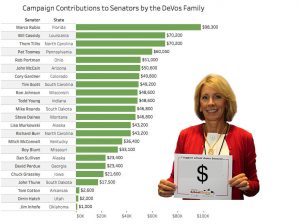During the elongated campaign season, Donald Trump promised a variety of unique proposals along with a different pattern of governing. His most salient campaign issue was to “make our government honest again”. He would accomplish this by trying to “drain the swamp,”a phrase that originated when President Reagan used it in 1983 to refer to “limiting the reach and growth of the government”. Since then, House Minority Leader, Nancy Pelosi has used the phrase to counter ten years of Republican House Control. And now, the phrase has evolved to become a salient issue for Donald Trump. He ensured he would drain the swamp by guaranteeing an elimination of corruption in government through attempting to get money, lobbying, and establishment-supported politicians out of Washington D.C. Many voters made this their most salient issue in the election especially when the opposition, Hillary Clinton, was characterized as one of the nation’s most corrupt politicians. Although this position was significant to the Trump campaign, let’s take a look at how Trump has been doing in his attempts to drain the swamp.
Trump’s pick for Secretary of State is Rex Tillerson, the former CEO of ExxonMobil. Not only has Tillerson proven to be extremely friendly with Putin’s government, but his net worth is also around 180 million dollars. Considering Trump’s promise of removing money from politics, Tillerson is decidedly a step backwards in this goal. The CEO of a prosperous gas company is the opposite of what Trump promised to the American people. Many pundits and citizens claim that these factors do not matter as long as these picks work in a manner where their past doesn’t affect their current job, but this has been proven impossible by many of Trump’s nominations.
During Rex Tillerson’s senate confirmation hearing on January 11th, Senator Tim Kaine (Virginia) and Tillerson had an interesting exchange when Kaine pressed Tillerson about ExxonMobil’s acknowledgement of climate change, a position contrary to that of President Trump and many of his appointees. Instead of answering the question, however, Tillerson claimed that he could not answer any questions regarding the company’s views, as he was no longer with ExxonMobil. The sequence ended with Kaine questioning, “Do you lack the knowledge to answer my question, or refuse to answer my question?” to which Tillerson replied, “A little of both.” Tillerson’s reply shows how unwilling he is to give the public the correct response to the question. Tillerson’s continued avoidance of the questions also points to possible personal investments in the situation or company. These personal investments and outside interests could potentially cause actions that are not beneficial to the America people but are instead profitable to Tillerson himself.
Another pick from the Trump Administration that has been hypocritical to claims of draining the swamp is Betsy DeVos, the President’s pick for Secretary of Education. DeVos’s net worth is estimated to be 5.1 billion dollars, and she has contributed an abundance of money to Republican nominees across the country. This image doesn’t even account for all the money given to the Republican Party by the DeVos family as a whole. Reports claim that DeVos’s family may have contributed nearly 8.3 million dollars to Political Action Committees, PACs, that support the Republican Party, in addition to the money that helped Republican senators’ campaigns.
The nomination of DeVos shows an obvious prioritization of her monetary contributions over her qualifications. In addition, the senate confirmation hearings prove her incompetence in the education realm as DeVos was apparently unaware of the rudimentary and contemporary educational debate surrounding proficiency vs growth. The video above shows how Senator Al Franken from Minnesota questions DeVos about this critical issue, while DeVos is completely unaware of this affair. As a result, the Trump Administration failed to deliver on their promise of draining the swamp as they picked an unqualified candidate that has no education beyond a Bachelor of Arts or experience in the education realm.
Trump did not stop with these two appointments but continued to appoint rich businessmen, directly negating his campaign promise of draining the swamp. Steven Mnuchin, a former partner of Goldman Sachs and hedge fund manager, was named the Secretary of Treasury. Mnuchin donated nearly a quarter of a million dollars to Trump and the Republican National Committee. Although the Mnuchin family has donated money to the Democrats as well, the appointment is principally a direct contradiction of what Trump promised.
Not only did Trump promise that he would attempt to take money out of politics, he also promised that he would get rid of establishment-based politicians that control Washington D.C.. Many supporters claim that Trump just said that to get elected and did not mean it, but he continued to reiterate his promises during his Inauguration Speech. His attempts at this have been faulty so far, especially considering the appointment of nominees like Tillerson and DeVos.

Additionally, Trump’s appointment of Jeff Sessions as the Attorney General shows that he has not been able to abolish establishment-based politicians. Sessions ranks 15th in seniority, as he has been an Attorney for the Southern District of Alabama since 1981, the Attorney General of Alabama since 1995, and a United States Senator for Alabama since 1997. Sessions has not only been in politics for almost forty years but has also been in the Senate for twenty years. Although many could argue that Jeff Sessions has an abundance of experience, candidates that have been in Washington D.C. for years are exactly the type of candidate that Trump promised he would stay away from.
Trump’s nomination of Reince Priebus, a politician that has served as the Republican National Committee Chairman, RNC general counsel, and the chairman of the Republican Party of Wisconsin furthers this claim. Nominating the chairman of the Republican National Party is someone Trump would consider to be part of the “swamp,” yet instead of nominating someone else, he chose Priebus.
In addition to these two nominations, Trump has nominated long-time politicians like Nikki Haley (former Governor and House of Representatives of South Carolina since 2005) as the Ambassador to the United Nations and Sonny Perdue (Georgia politician since 1991) as the Secretary of Agriculture.
Republicans all over the board continue to try to compare the cabinet of Obama versus Trump. Individuals try to claim that Obama’s cabinet was much more corrupt when compared to Trump’s in hindsight. Although this point of view can be argued by both sides of the spectrum, one, thing is for sure – Obama did not run a platform where he pushed “draining the swamp” as one of his largest campaign issues.


